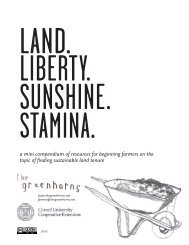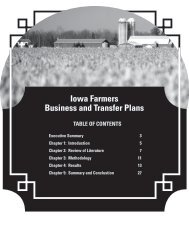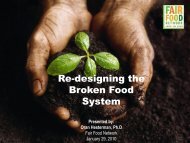I Believe in the Future of Farming[1] John Ikerd[2] I ... - Greenhorns
I Believe in the Future of Farming[1] John Ikerd[2] I ... - Greenhorns
I Believe in the Future of Farming[1] John Ikerd[2] I ... - Greenhorns
You also want an ePaper? Increase the reach of your titles
YUMPU automatically turns print PDFs into web optimized ePapers that Google loves.
management) with mechanization and chemistry (capital and technology). In addition,<br />
many displaced farmers are no longer able to f<strong>in</strong>d <strong>of</strong>f-farm employment adequate to<br />
support <strong>the</strong>ir families <strong>in</strong> <strong>the</strong> falter<strong>in</strong>g non-farm economy. We also see a grow<strong>in</strong>g social<br />
and economic <strong>in</strong>equity with <strong>the</strong> concentration <strong>of</strong> wealth <strong>in</strong> agriculture among <strong>the</strong> largest<br />
farm operators, non-residential landlords, and corporate agribus<strong>in</strong>ess <strong>in</strong>vestors. We see<br />
degradation <strong>of</strong> <strong>the</strong> soil though cultivation, depletion <strong>of</strong> water through irrigation, and<br />
pollution <strong>of</strong> water with agricultural chemicals. Large-scale conf<strong>in</strong>ement animal feed<strong>in</strong>g<br />
operations or CAFOs are <strong>the</strong> epitome <strong>of</strong> everyth<strong>in</strong>g wrong with <strong>in</strong>dustrial agriculture.<br />
They pollute <strong>the</strong> soil, air, and water with biological and chemical wastes, destroy<br />
economic opportunities for farm families, and rip asunder <strong>the</strong> social fabric <strong>of</strong> rural<br />
communities.<br />
Many farmers are also caught up <strong>in</strong> <strong>the</strong> perils <strong>of</strong> ris<strong>in</strong>g energy costs with an<br />
agriculture that is hopelessly dependent <strong>of</strong> fossil energy. The impressive productivity <strong>of</strong><br />
American agriculture is a direct consequence <strong>of</strong> cheap fossil energy – for fuels,<br />
fertilizers, and transportation. The American food system claims about 20% <strong>of</strong> all fossil<br />
energy used and requires about 10 calories <strong>of</strong> fossil energy for each calorie <strong>of</strong> food<br />
energy produced. About one-third <strong>of</strong> this total is accounted for at <strong>the</strong> farm level. The food<br />
system contributes a similar share <strong>of</strong> environmental problems, as greenhouse gasses are<br />
<strong>in</strong>evitably released through <strong>the</strong> use <strong>of</strong> fossil energy. Farm<strong>in</strong>g poses an added threat to<br />
global climate change through <strong>the</strong> release <strong>of</strong> methane, a powerful greenhouse gas, from<br />
livestock operations and carbon dioxide from tillage <strong>of</strong> <strong>the</strong> soil.<br />
A new challenge loom<strong>in</strong>g on <strong>the</strong> horizon is <strong>the</strong> grow<strong>in</strong>g public awareness <strong>of</strong> <strong>the</strong> ris<strong>in</strong>g<br />
costs <strong>of</strong> health care, which have paralleled <strong>the</strong> <strong>in</strong>dustrialization <strong>of</strong> agriculture. Diet<br />
related illnesses are rampant <strong>in</strong> America, <strong>in</strong>clud<strong>in</strong>g obesity, diabetes, hypertension, heart<br />
failure, and various types <strong>of</strong> cancers. Obesity related illnesses alone are projected to<br />
claim about one-<strong>in</strong>-five dollars spent for health care <strong>in</strong> America by 2020 – eras<strong>in</strong>g<br />
virtually all <strong>of</strong> <strong>the</strong> ga<strong>in</strong>s made <strong>in</strong> improv<strong>in</strong>g public health over <strong>the</strong> past several<br />
decades. [vii] A grow<strong>in</strong>g body <strong>of</strong> scientific evidence l<strong>in</strong>ks <strong>in</strong>dustrial agriculture to foods<br />
that are rich <strong>in</strong> calories and poor <strong>in</strong> nutrients, thus help<strong>in</strong>g to fuel <strong>the</strong> epidemic <strong>of</strong> obesity<br />
and o<strong>the</strong>r diet-related illnesses. [viii]<br />
The <strong>in</strong>dustrialization <strong>of</strong> agriculture has been an absolute failure. A larger percentage<br />
<strong>of</strong> Americans are “food <strong>in</strong>secure” today than dur<strong>in</strong>g <strong>the</strong> 1960s. Those who can afford to<br />
buy enough food are far less healthy. We are not meet<strong>in</strong>g <strong>the</strong> needs <strong>of</strong> <strong>the</strong> present and<br />
certa<strong>in</strong>ly not leav<strong>in</strong>g equal or better opportunities for <strong>the</strong> future. An <strong>in</strong>dustrial agriculture<br />
is not susta<strong>in</strong>able. Our current systems <strong>of</strong> farm<strong>in</strong>g and food production are not<br />
susta<strong>in</strong>able. Fundamental change <strong>in</strong> our systems <strong>of</strong> farm<strong>in</strong>g and food production is not an<br />
option; it is a necessity.<br />
Fortunately, <strong>the</strong> alternative vision for a positive future <strong>in</strong> farm<strong>in</strong>g can be found <strong>in</strong> a<br />
return to real farm<strong>in</strong>g – to what farm<strong>in</strong>g was before <strong>the</strong> <strong>in</strong>dustrialization <strong>of</strong> agriculture.<br />
The word farmcomes from Middle English word, ferme ("variously mean<strong>in</strong>g: tenant, rent,<br />
revenue, stewardship, meal, feast"), from Old English feorm, farm ("mean<strong>in</strong>g provision,<br />
food, supplies, possessions, rent, feast"), from Proto-Germanic firmō, firχumō ("means <strong>of</strong>


![I Believe in the Future of Farming[1] John Ikerd[2] I ... - Greenhorns](https://img.yumpu.com/38821670/5/500x640/i-believe-in-the-future-of-farming1-john-ikerd2-i-greenhorns.jpg)



